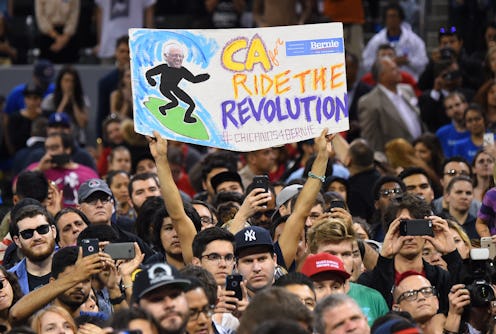News
Bernie Sanders Doesn't Show Signs Of Quitting Yet
When it comes to narrowing the field for the Democratic presidential nomination, Vermont Sen. Bernie Sanders doesn't appear to be going anywhere. The conundrum, though, is that he also doesn't appear to be going anywhere fast. After Tuesday's Democratic primaries in Kentucky and Oregon, Sanders gave no indication of dropping out of the race, but there's also no guarantee that he'll win enough delegates in the coming contests to upset frontrunner Hillary Clinton.
During the May 17 primaries, Sanders edged out Clinton in Oregon, winning the vote but still leaving many of the state's 61 pledged delegates on the table for Clinton to snag. In Kentucky, he fared even worse. The Bluegrass State's Democratic primary was too close to call for hours after the polls closed, even with 99 percent of the vote calculated. Despite the close numbers, Sanders appeared to have lost, though. Overall, Sanders may have ended the night with a larger delegate haul than Clinton, but Clinton remained far ahead of him in the total delegate count.
Although he wasn't able to move the needle very much, Sanders' campaign seemed unfazed by Tuesday's results. The team understandably celebrated his win in Oregon on Twitter and didn't mention anything about Kentucky. What's more, the campaign called Sanders' victory in Oregon a "strong victory" when the strength of his victory could have easily been up for debate. With more than 60 percent of the vote in, Sanders had only secured four more delegates than Clinton in Oregon, according to The New York Times.
Sanders may stay in the race for now, but it's difficult to see how long his campaign can viably last if he fails to significantly narrow the margin between him and Clinton. Narrow wins and split delegate counts make for a steady path, but Sanders might be running out of time. The final Democratic primary will take place in less than a month, on June 12 in Washington, D.C — and he needs to do much more than split the delegates with Clinton between now and then to win the nomination.
The Vermont senator has indicated previously that he would stay in the race until the very end. After all, it's a political revolution he's after, and revolutions tend to follow a bumpy path. Even if he doesn't stay in the race until his party's nominating convention this July, it's possible that Sanders will at least hang on through the California primary, which will occur on June 7. For Democrats, that contest will allocate more than 500 delegates, and a loss for Sanders in California could be the final straw for his campaign.
